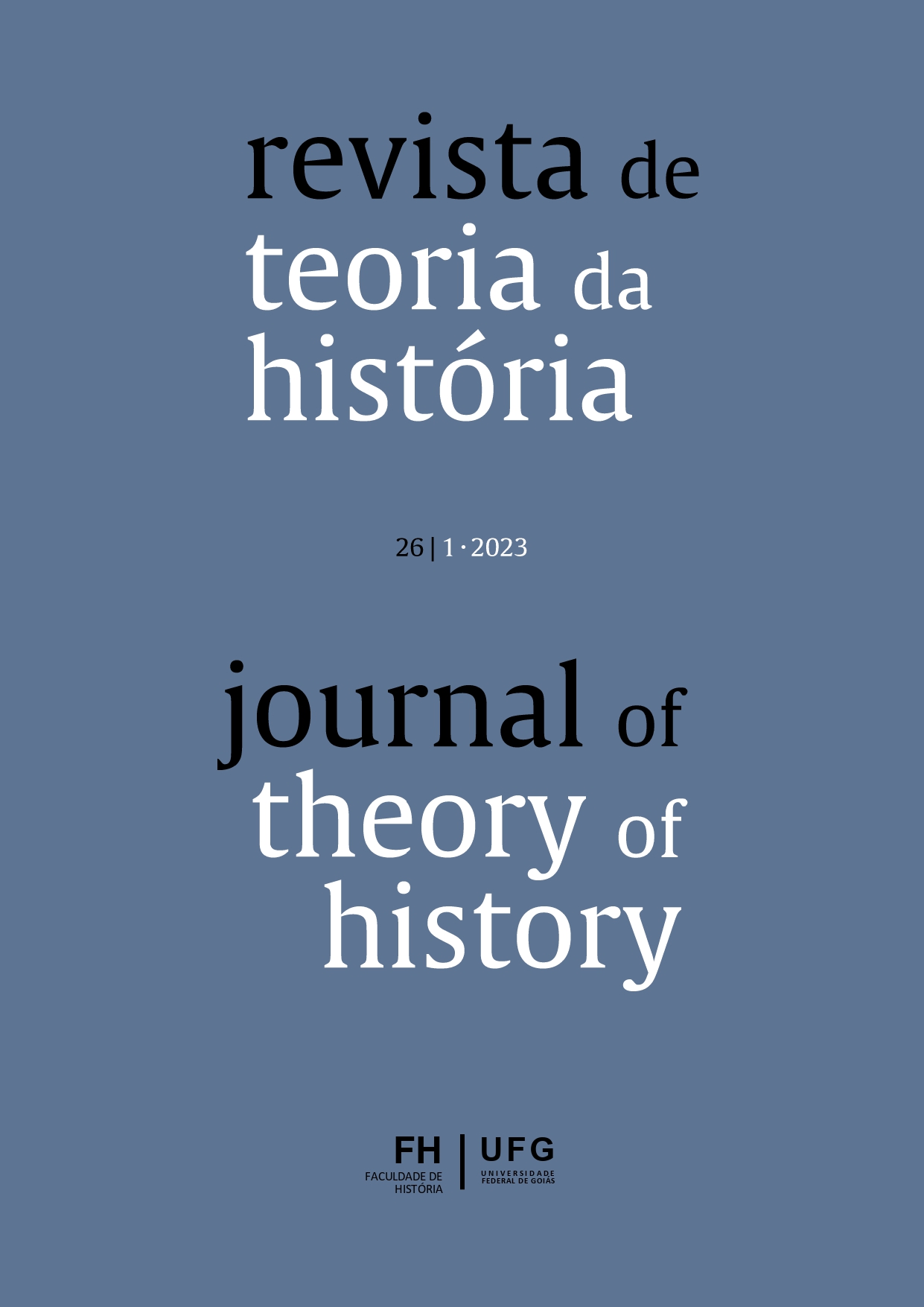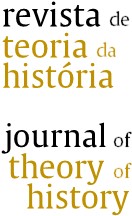Conversa sobre Teoria da História com o ChatGPT
Abstract
This interview was made in Portuguese, on February 17, 2023, in the OpenAI portal page with ChatGPT – acronym for Chat Generative Pre-trained Transformer – an anabolic chatbot developed in partnership with Microsoft and which uses a generative mechanism capable of examine extensive databases and dialogue with users in different languages. Chatbots are computer programs that interact with users through rules and pre-defined phrases existing in a limited set of data, used in the service of telephone companies, businesses and some companies for some time. ChatGPT, however, with its advanced learning system, called GPT3, brought a more natural, fluid and fast communication. He is able to craft longer answers by combining varied information in creative ways. It doesn´ t cut out texts or phrases – as if plagiarizing them –; according to its creators, it learns and improves its answers more and more, creating its own version on various subjects. Launched as a prototype on November 30, 2022, it has since become a sensation for the quality of its responses, generating a broad debate about its uses, risks and repercussions. Upon its launch in January 2023, the program reached over 100 million users and its value was estimated at approximately $30 billion. According to its developers, ChatGPT is also capable of adjusting its responses to the user's profile, facilitating communication and understanding. It was with the intention of getting to know their skills that I decided know this tool better and test their knowledge in Theory of History.
References
AGAMBEN, Giorgio. O aberto: o homem e o animal. Rio de Janeiro: Civilização Brasileira, 2017.
ALMEIDA, Juniele Rabêlo; ROVAI, Marta Gouveia de Oliveira (Org.). Introdução à História Pública. São Paulo: Letra e Voz, 2011.
ANKERSMIT, Frank. Historical Representation. Stanford: Stanford University Press, 2002.
ANKERSMIT, Frank. Meaning, Truth, and Reference in Historical Representation. Cornell: Cornell University Press, 2012.
ANKERSMIT, Frank. Narrativismo y teoría historiográfica. Santiago: Finis Terrae, 2013.
ARAUJO, Valdei L. de; PEREIRA, Mateus H. Atualismo 2.0. Edição revista e ampliada. Vitória: Milfontes, 2022.
AVELAR, Alexandre de Sá; VALIM, Patrícia. Apresentação do dossiê: Negacionismos e usos da história. Revista Brasileira de História, n. 41, v. 87, 2021.
ÁVILA, Arthur, NICOLAZZI, Fernando (Org.). A história indisciplinada. Vitória: Milfontes, 2020.
BARTHES, Roland. A escrita da história. In: O rumor da língua. São Paulo: Brasiliense, 1984.
BENTIVOGLIO, Julio; TOSI, Verónica (Org.). Do passado histórico ao passado prático: 40 anos de Meta-história. Vitória: Milfontes, 2017.
BENTIVOGLIO, Júlio; AVELAR, Alexandre de Sá (Org). O futuro da história: da crise à reconstrução de teorias e abordagens. Vitória: Milfontes, 2019.
BERNHEIM, Ernst. Introdução à ciência histórica. Vitória: Milfontes, 2021
BLOCH, Marc. Apologia da história ou o ofício do historiador. Rio de Janeiro: Zahar, 2002.
BOUTIER, Jean; JULIA, Domenique (Org.). Passados recompostos. Rio de Janeiro: FGV, 1998.
CARR, Edward H. O que é a história? Rio de Janeiro: Paz e Terra, 1996.
DELGADO, Lucília de A. N.; FERREIRA, Marieta de Moraes. História do tempo presente: desafios. Rio de Janeiro: FGV, 2003.
DILTHEY, Wilhelm. Introdução às Ciências Humanas: tentativa de uma fundamentação para o estudo da sociedade e da história. Rio de Janeiro: Forense Universitária, 2010.
DOMANSKA, Ewa. Encounters: Philosophy of history after postmodernism. Richmond: University of Virginia Press, 1998.
DOMAŃSKA, Ewa. Para Além do Antropocentrismo nos estudos históricos. Expedições: Teoria da História & Historiografia, v. 4, n. 1, 2013.
DOSSE, François; DELACROIX, Christian; GARCIA, Patrick. Historicidade. Buenos Aires: Waldhuter Editores, 2010.
DOSSE, François. A história em migalhas. Campinas: Editora da Unicamp, 1992.
DROYSEN, Johann G. Manual de teoria da história. Petrópolis: Vozes, 2009.
GINZBURG, Carlo. O extermínio dos judeus e o princípio da realidade. In: MALERBA, Jurandir. A História escrita: teoria e história da historiografia. São Paulo: Contexto, 2006.
HUMBOLDT, Wilhelm von. A tarefa dos historiadores. In: MARTINS, Estevão R. C. A história pensada. São Paulo: Contexto, 2010.
IGGERS, Georg G. et al. (Org.). A global history of modern historiography. Harlow: Pearson Longman, 2008.
JENKINS, Keith. A história repensada. São Paulo: Contexto, 2004.
KOSELLECK, Reinhart. Espaço de Experiência e Horizonte de Expectativa. In: Futuro Passado: contribuição à semântica dos tempos históricos. Rio de Janeiro: Contraponto, 2006.
KUHN, Thomas. A estrutura das revoluções científicas. São Paulo: Perspectiva, 1985.
LANGLOIS, Charles-Victor; SEIGNOBOS, Victor. Introduction aux études historiques. Paris, Hachette, 1898.
LIMA, Luiz Costa. A aguarrás do tempo. Rio de Janeiro: Rocco, 1989.
LIMA, Luiz Costa. História, ficção, literatura. São Paulo: Companhia das Letras, 2006.
LIMA, Luiz Costa. Máscaras da mímesis. Rio de Janeiro: Record, 1999.
LORENZ, Chris; BEVERNAGE, Berber (Org.). Breaking up time: negotiating the borders between present, past and future. Goettingen: Vandenhoeck & Ruprecht, 2013.
MALERBA, Jurandir. Fazendo história pública. Vitória: Milfontes, 2021.
MICHELET, Jules. L’Oiseau. Paris: Hachette, 1858.
NORA, Pierre et al. (Org.). História: novos objetos. Rio de Janeiro: Francisco Alves, 1978.
OLIVEIRA, Maria da Glória. Os sons do silêncio: interpelações feministas decoloniais à História da historiografia. História da Historiografia, v. 11, n. 18, 2018.
PAUL, Herman. Hayden White. Cambridge: Polity Press, 2011.
PIMENTA, João Paulo G. O livro do tempo: uma história social. Lisboa: Edições 70, 2021.
RANKE, Leopold von. A história como ciência e como arte. In: MALERBA, Jurandir (Org.). Lições de história: o caminho da ciência no longo século XIX. Rio de Janeiro: FGV, 2010.
RICOEUR, Paul. History and truth. Evanston: Northwestern University Press, 2007.
ROUSSO, Henri. A última catástrofe: a história, o presente, o contemporâneo. Rio de Janeiro: FGV, 2016.
ROVELLI, Carlo. A ordem do tempo. São Paulo: Objetiva, 2018.
RÜSEN, Jörn. Razão histórica. Brasília: Unb, 2001.
RÜSEN, Jörn. Teoria da História: uma teoria da história como ciência. Curitiba: Editora UFPR, 2015.
SALOMON, Marlon J. Heterocronias: estudos sobre a multiplicidade dos tempos históricos. Rio de Janeiro: Ricochete, 2018.
SCHAFF, Adam. History & truth. New York: Pergamon, 1976.
SIMON, Zoltán Boldizsár. Os teóricos da história têm uma teoria da história? Reflexões sobre uma não-disciplina. Vitória: Milfontes,2019.
TURIN, Rodrigo. Tempos precários: aceleração, historicidade e semântica neoliberal. São Paulo: Zazie Edições, 2019
VEYNE, Paul. Como se escreve a história? Lisboa: Edições 70, 2008.
WHITE, Hayden. Meta-história: a imaginação histórica no século XIX. São Paulo: Edusp, 1995.
Downloads
Published
How to Cite
Issue
Section
License
Copyright (c) 2023 rth |

This work is licensed under a Creative Commons Attribution-NonCommercial-NoDerivatives 4.0 International License.
The journal publishes only and exclusively original manuscripts. All rights reserved.
Licensed under a Creative Commons Attribution-NonCommercial-NoDerivatives 4.0 International License



